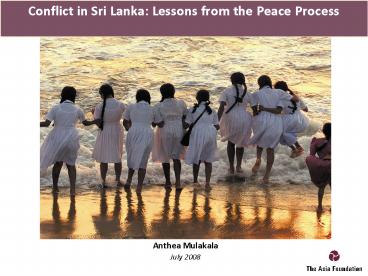Conflict in Sri Lanka: Lessons from the Peace Process - PowerPoint PPT Presentation
1 / 10
Title:
Conflict in Sri Lanka: Lessons from the Peace Process
Description:
international interest in Sri Lanka increased ... shunned international intervention in any matters concerning peace, politics or ... – PowerPoint PPT presentation
Number of Views:137
Avg rating:3.0/5.0
Title: Conflict in Sri Lanka: Lessons from the Peace Process
1
Conflict in Sri Lanka Lessons from the Peace
Process
- Anthea Mulakala
- July 2008
2
Sri Lanka Snapshot
- 20 million population
- 74 Sinhalese, 13 Tamil, 7 Muslim 6
PlantationTamil - Buddhism is dominant religion, Hinduism,
Christianity, Islam - Poverty widespread with 45 living on less than
2 day but SL is considered a MIC - GDP 6-8 due to garment and services sectors,
remittances - Parliamentary system with executive presidency
- Highly centralized state dominated by one ethnic
group since Independence
3
Conflict Dynamics
- Protracted more than 25 yrs of conflict
- Bloody Upwards of 200,000 killed
- Human Rights Abuses abductions, extrajudicial
killing, child soldiers, - Centre-periphery highly centralized state in
direct conflict with LTTE who control a
peripheral region no meaningful efforts to
devolve power - Ethno political or identity based minority Tamil
grievances based on institutionalized Sinhalese
dominated state discrimination in language, govt
jobs, land resettlement - Minority Majority mentality Tamils are a
minority in Sri Lanka but a majority in the
region Sinhalese are majority in Sri Lanka but a
minority in the region - Transnational large diaspora support for the
LTTE in particular (Canada, Australia, UK) - Multi-polar intra ethnic tensions, divisions
within political parties
4
Peace Process Achievements 2002- 2004
- Informal ceasefires in 1987, 1990, 1994 formal
ceasefire and peace process from 2002-2006 - Achievements 2002 Peace Process
- no war situation saved lives and improved living
conditions, - revitalized economy
- delinked the ethnic conflict from war and
violence - international interest in Sri Lanka increased
- generated useful ideas on political settlement
options - peace demonstrated that parties to conflict could
work together to find solutions to difficult
issues. - access to the North East and LTTE
5
Failings
- Imbalanced focus on economic reform and related
peace dividends rather than political issues. - Cohabitation problem between the Prime Minister
and President - Inclusivity bilateral process which failed to
include other communities eg Muslims Govt
ignored the south, LTTE suppressed other Tamil
voices - Root causes not addressed like language rights,
lack of trust in security forces, power sharing
and governance - Parties did not initiate a constructive public
discussion on how to reconstruct the Sri Lankan
state - Little focus on the final solutions whether
federal or confederal, special autonomy etc. - Miscalculated internationalization aid
incentives, weak mandate of SLMM, alliances with
UNP - Centrality of human rights not respected
- Poor public communication
6
Similarities with other regional conflicts
Battle for self-determination (e.g. Aceh,
Thailand) Conflict has established military
stalemates (e.g. Nepal, Aceh, Philippines) Centre
Periphery Conflict (e.g. Nepal, Thailand, Aceh,
Philippines) Ethno political or Identify
conflict (e.g. Thailand, Philippines) Protracted
Lack of International Involvement (e.g.
Myanmar, Thailand)
Center-periphery conflicts
7
Contributing Factors to peace process success in
Indonesia and failure in Sri Lanka
- Sri Lanka
- LTTE as distinctly hierarchical, highly
centralized, without democratic process - LTTE proscribed as a terrorist organization
- LTTE heavily armed, trained conventional, naval
and air capacity - LTTE runs state within state police, justice,
education, political, banking - Lack of acceptance by all parties of any form of
simple federalism or confederation - One large majority that dominates the state and
has conceded little in terms of power sharing
similar unitarian dominance in LTTE - Tsunami and related resources further entrenched
divisions
- Aceh/Indonesia
- GAM had a flatter structure, looser ideology than
the LTTE - GAM not proscribed as a terrorist organizatoin
- GAM lightly armed to defeat TNI
- GAM limited state capacity and infrastructure
- Aceh was allocated degree of genuine political
autonomy within an increasingly loose unitary
state. - Indonesia moving more towards democratic system
- Tsunami accelerated peace
8
Current Situation in Sri Lanka
- Country at war govt convinced of the necessity
of military defeat of the LTTE - North East demerged and political process in the
East to bring former Tamil rebel faction into
mainstream and as alternative to LTTE - LTTE weakened and fractionalized
- North closed East now open for development and
stabilization - Human rights abuses escalating by both sides at
frightening pace - Humanitarian Crisis
- Govt has shunned international intervention in
any matters concerning peace, politics or human
rights and has sought economic and military
assistance from Pakistan, China, Iran and India - Hardliners in the ascendancy on both sides
- War economy
9
Future Prospects for Sri Lanka
Govt must deliver credible power sharing
arrangements which can satisfy all the
communities in Sri Lanka and allow high degree of
self governance in North and East LTTE must be
willing to settle for less than a separate state
and accept they are not sole representatives of
Tamils Decreasing the power and resource gap
between the centre and periphery Given de-merger
of North and East, peace prospects are unlikely
in near future Careful, long term and balanced
international support
10
- Thank you
- amulakala_at_asiafound.org































